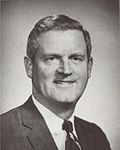Background
During the late 1960s, Virginia politics was being radically transformed by the numerical growth of an electorate that for six decades was relatively the smallest in the nation due to cumulative poll taxes and literacy tests excluding almost all blacks and poor whites. [1] The Twenty-Fourth Amendment, aided by subsequent drives to register blacks, [2] and the Voting Rights Act greatly expanded Virginia's electorate. Consequently, the statewide Democratic party was severely divided into conservative, moderate and liberal factions, [3] despite Godwin having united those factions behind him in the 1965 gubernatorial election. [4]
Intractable Democratic divisions
By the time of the 1969 primaries, however, the divisions within the party were becoming irreconcilable. [5] Whereas the 1965 gubernatorial primary was the first uncontested one for over half a century, each of the three factions would nominate its own candidate in 1969. [5] Incumbent Lieutenant Governor Fred G. Pollard would be the conservative nominee, whilst the liberals nominated Henry Howell of Norfolk – long a center of liberal opposition to the Byrd machine [6] — and the moderates descended from the "Young Turks" of the 1950s backed William C. Battle, son of a former governor.
Primary campaigns
Howell, opposed even by the relatively liberal Senator Spong, would by the first to begin his campaign in the primary during June, relying on Hubert Humphrey's support base of blacks and members of the United Mine Workers. Pollard and Battle, who announced their candidacies somewhat later, would campaign against Howell mainly in the "urban corridor" between Virginia Beach and the Washington metropolitan area. [7] Both Pollard and Battle attacked Howell as an extremist oriented against big business, [8] Whilst mostly focused upon their opposition to Howell, Battle reiterated his claim that Pollard was oriented toward Byrd conservatism, whilst Pollard challenged Battle on lack of experience. [5]
Pollard's failure to win more than 23 percent of the vote in the first primary would mark the final demise of the Byrd machine within the state Democratic party. Battle continued his attacks on Howell in the runoff primary [a] and, aided by the endorsement of sitting Governor Godwin, managed to narrowly defeat him. [5]
Weakening and splitting of conservative opposition
The 1965 gubernatorial election had seen the Conservative Party split from both major parties in opposition to President Johnson's civil rights and welfare programs. [9] However, the Conservative Party's role in the demise of the Byrd machine in the 1966 Senatorial elections alienated most of its core base. [10] Bickering within the Conservative Party, due to Virginia's unusually liberal ballot access laws [b] and debates over how to nominate electors pledged to American Independent presidential nominee George Wallace, [11] however, meant that the party was severely divided by the time of the presidential election, and by the summer of 1969 it was clear that there was no possibility of reconciliation between the two parties, [12] especially after one member of the Conservatives alleged the American Independent Party was campaigning to elect sitting Lieutenant Governor Pollard to the governorship. [13]
Conservative opposition to the major parties became further divided when George Walker, who sought the American Independent nomination for Governor in January, [14] but former "states' rights" nominee and AIP state president T. Coleman Andrews said that Walker had no authority to run under the party's label soon after. [15] In August Andrews – initially expected to run himself – would nominate William Pennington of Buckingham County as the party's candidate, [16] whilst Walker would run as an independent.
GOP unites behind second-time nominee
Amidst the splitting of the right and of the state Democratic Party, Virginia's Republican Party, which remained under the control of moderates from the southwestern valleys, [17] united behind 1965 nominee A. Linwood Holton at a very early stage: Holton had been nominated as early as March 1. He would be able to combine his "progressive" reputation with his ties to the Nixon administration in such a manner as to avoid alienating voters. [18] He would focus on the putative advantages ties to Nixons' administration would provide for voters and upon Battle's connections with the liberal national Democratic party.
Analysis
The Democrats had held the governor's mansion for 84 years since 1885, and Holton's victory was considered a historic upset at the time. [25] This was the first occasion when Republicans won a gubernatorial election in the state, and Holton even won 37 percent of the African American vote [26] – a substantial share of which was won from blacks who had backed the liberal Howell in the two Democratic primaries. [27] Holton was also helped by defections from Battle by supporters the conservative of Pollard in the first primary, [28] although the Republican's largest gains were in the rapidly growing urban corridor, [18] where Holton had been weakest in his previous gubernatorial run. Support from sitting President Nixon was another critical aspect of Holton's win.
As of 2025, this is the last occasion when the City of Alexandria voted Republican for Governor, but also the last when New Kent County, [e] Pittsylvania County, Powhatan County and Prince George County [e] voted Democratic for Governor.
This page is based on this
Wikipedia article Text is available under the
CC BY-SA 4.0 license; additional terms may apply.
Images, videos and audio are available under their respective licenses.





